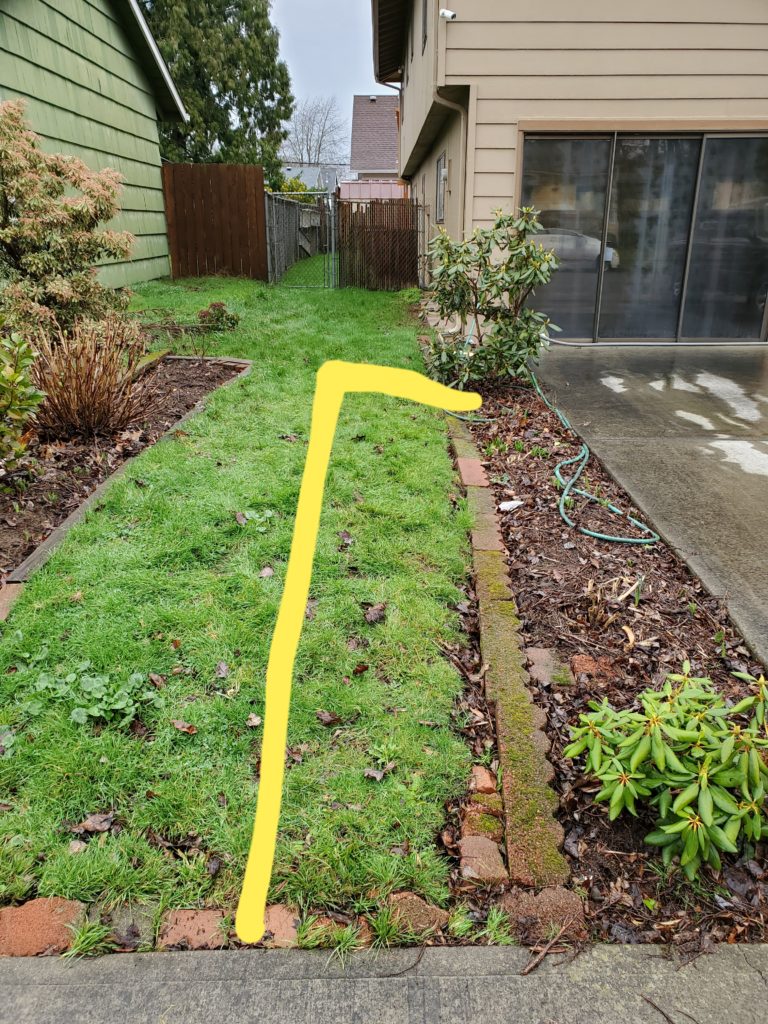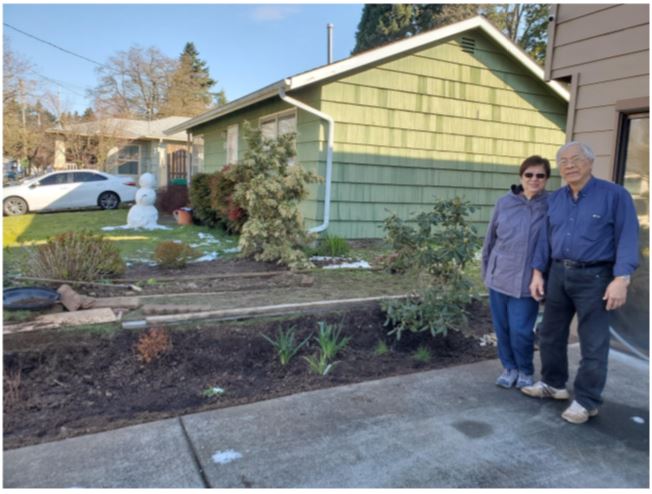The following article is shared from Jeffrey Lee’s “Engaging the Portland Chinese Community: A Rain Garden Workshop” Project Report.
The Bilingual Nature program focuses on creating public events for communities on a relevant environmental topic in their native language with youth from the communities leading all planning, implementation and follow up communications. Theresa Huang, Speak Creek Intern, and Jeffrey Lee, Independent Speak Creek Contractor, did incredible work on this project.
Despite the final event being canceled due to COVID-19, information has been shared, translated, and a free rain garden installed for a local family in the Chinese community.
We would like to thank the homeowners, Betty and Peter, for being willing to let us install a rain garden in their yard to serve as an example for the rest of the Chinese community, and the result has come from a deep communication between us, East Multnomah Soil and Water Conservation District (EMSWCD) , and the homeowner. Without the homeowners agreement, this project wouldn’t happen.
Recognition and appreciation goes out to our project partner the Chinese Presbyterian Church (砵崙華人長老會), for working with us and being willing to share the rain garden workshop with their congregation and planning to host the event in the church. As well as our technical partner EMSWCD for providing technical guidance for planning, preparing, installing, and maintenance of rain garden.
Read on to learn about findings from the Project Report.


The following text has been copied from Engaging the Portland Chinese Community: A Rain Garden Workshop by Jeffrey Lee.
Project Goals
JCWC is taking the steps to ensure all people experience the benefits of a livable environment and healthy watershed, and reduce environmental disparities affecting underserved and underrepresented communities.
- Provide resources and economic opportunities to those whose experiences and cultures are traditionally excluded from mainstream settings.
- Build relationships with new communities and empower them to participate or lead in restoration activities across the watershed.
- Evolve as an organization to better reflect our diversity, equity, and inclusion (DEI) goals and objectives, with feedback and guidance from our current and future community partners.
- Maintain relevance, grow more effective, and better address the needs of our diverse communities especially those disproportionately impacted by climate change.
- Inspire and create useful solutions solving complex watershed issues while fostering a more diverse, representative conservation movement.
Project Objectives
Our Bilingual Nature Program is just one of several JCWC programs addressing equity and inclusion. This work is currently funded by Meyer Memorial Trust, specifically for “community outreach to deepen equity, diversity and inclusion impact by engaging more people of color and immigrants from the watershed in stewardship and restoration efforts.” Through this program, we hire youth/young adult Speak Creek Interns to plan, coordinate, and host a multilingual nature event that addresses their community’s needs, challenges, and barriers in environmental education and outdoor access to nature (see Appendix for Position Description and Work Plan).
For this project catered towards the Chinese-speaking community, we hired Theresa Huang as our Speak Creek Intern. Theresa brought in a wealth of experience as an early-career environmental professional and a deep knowledge of the Portland Chinese community.
NOTE: The rain garden workshop was cancelled due to health risks associated with COVID-19. Please see the ### for details on our COVID-19 response and plan.
Informed by her background in environmental studies and urban planning, Theresa arrived to her internship with an ambitious project idea already in mind!
Trees, natural areas, stormwater swales and open spaces make up what is referred to as Portland’s green infrastructure. Green infrastructure helps minimize risks from flooding and landslides, helps to cool the city — reducing impacts from the urban heat island effect — and creates an overall healthier and more pleasant environment for people.
Environmental Disparities in the Watershed
Communities of color and other historically marginalized groups experience a number of environmental injustices, and those of particular importance in the Johnson Creek watershed are inequitable investments and access to nature and disproportionate environmental risks due to climate change.
Access to nature promotes numerous benefits to one’s physical and mental health, sense of place and cultural identity, and quality of life. At an equity standpoint, opportunities to access greenspaces and environmental education should be considered alongside other urban service needs including affordable housing, health care, transportation, education, and employment opportunities. However, in the Portland-Vancouver region a number of complex factors such as historic agricultural and urban development, inequitable park investments, and habitat loss have displaced the natural landscape and left a legacy of diminished access to nature. Notably, the areas with above average poverty rates and/or shares of people of color tend to have worse access to public parks and/or greenspaces—in the Johnson Creek watershed this includes the Mill Park, Hazelwood, Centennial, and Powellhurst-Gilbert neighborhoods in East Portland; the Ardenwald neighborhood and Southgate CPO in Clackamas County; and the Rockwood neighborhood in Gresham.
